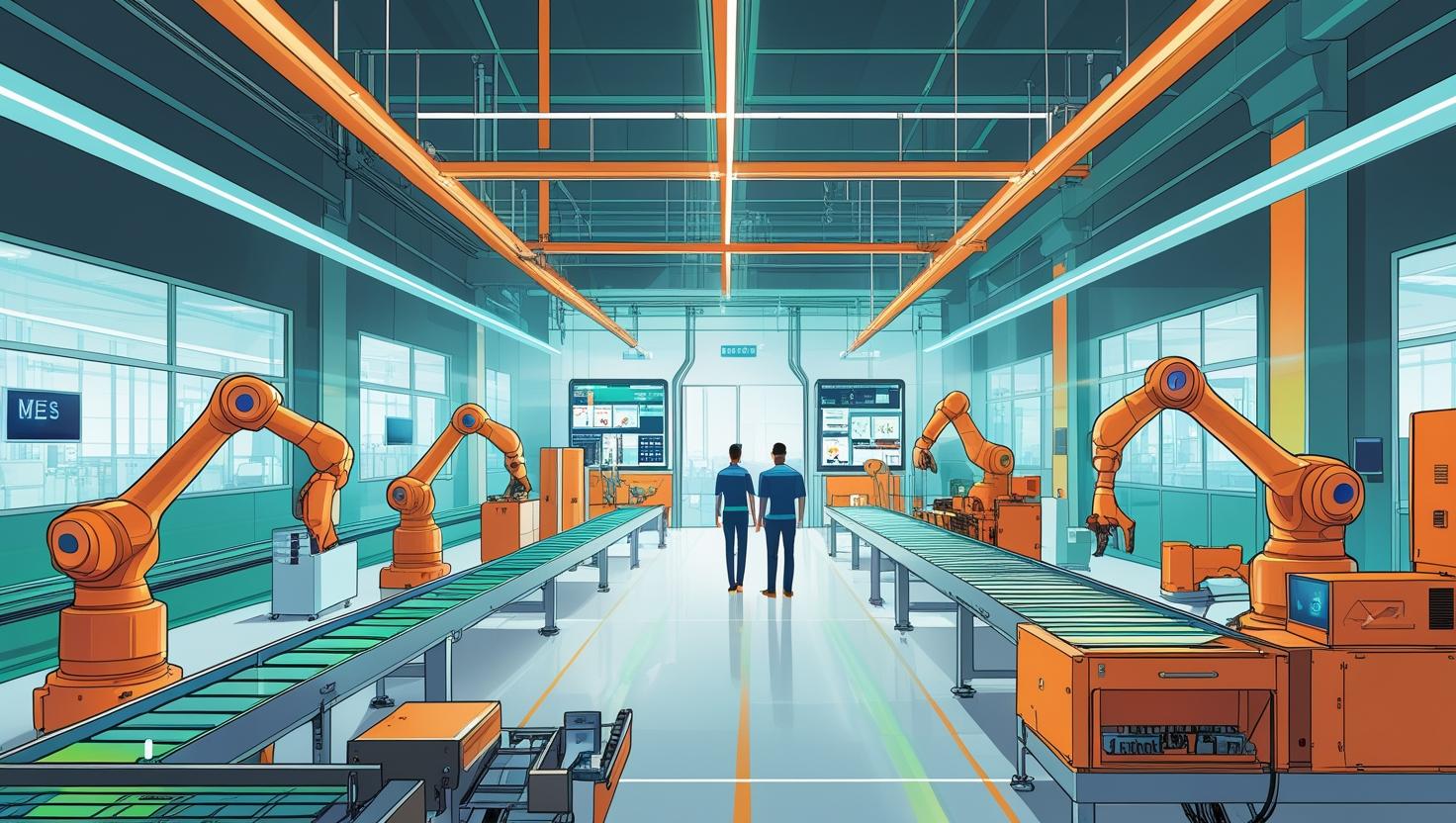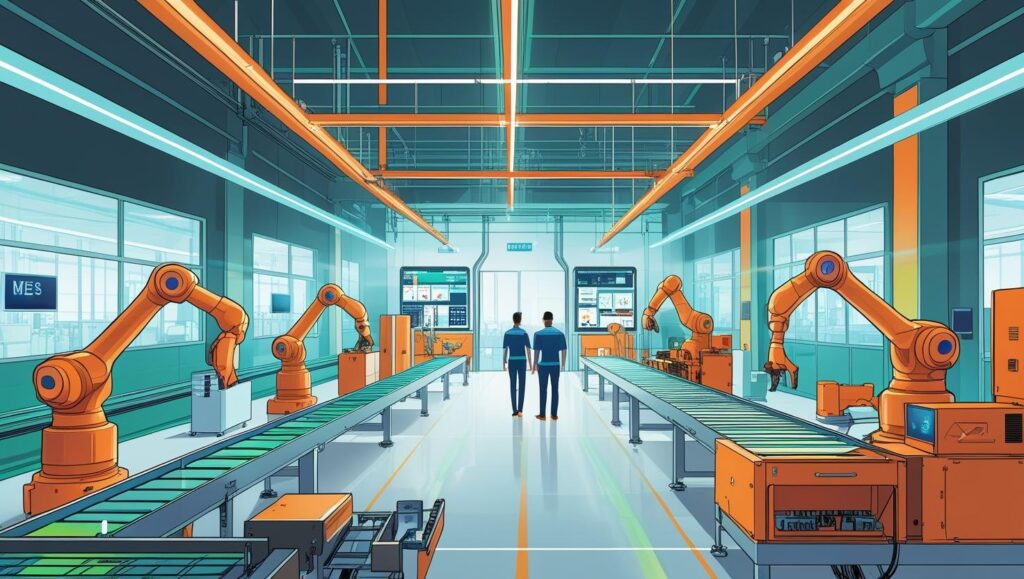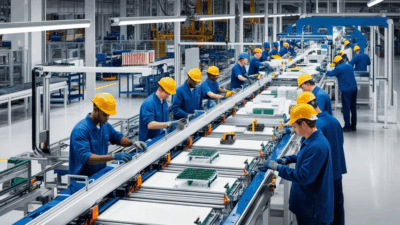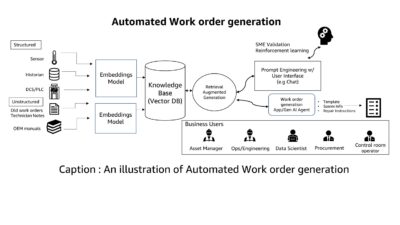Artificial intelligence (AI) and Manufacturing Execution Systems (MES) are a well-matched pair, enabling manufacturing processes.

MES insights
- Artificial intelligence (AI) and Manufacturing Execution Systems (MES) provide real-time data collection and management benefits for manufacturing processes.
- Certain technologies enable and enhance AI and MES.
- There are five best practices to achieve a smooth and effective AI integration with MES.
Manufacturing Execution Systems (MES) have been around for decades and positively impact manufacturing processes. These systems embrace legacy and modern technologies alike and work on the manufacturing production floor to manage and monitor processes. MES helps increase operations and efficiency and acts as the bridge between the enterprise resource planning (ERP) systems and the machinery on the factory floor.
MES plays a crucial role in collecting real-time data, controlling the manufacturing processes and synchronizing the operations running on the plant floor. It tracks production in real time and maintains quality standards. It also fine-tunes the processes in real time so that consumers have high-quality products. MES collects data from machines, human workers and raw materials and tracks and controls production. Due to its real-time data collection, management and control, it helps manufacturing personnel adhere to quality guidelines and increase productivity.
Just as MES has evolved over the past several years, so too has artificial intelligence (AI). Combining AI’s decades of innovation with MES helps manufacturers optimize their processes and gain a competitive advantage.
AI and MES: A well-matched pair
AI’s integration with MES is a crucial development within the manufacturing world and is revolutionizing industrial operations. The contributions AI brings to MES are increasing with each passing day and deliver several key benefits to manufacturers:
Advanced analytics for improved decision-making
Manufacturing analytics evolves to prescriptive analytics when machine learning and AI are combined with MES. In addition to predicting what will happen, this AI/analytics system recommends actions to optimize the outcomes. Analytics software, such as Rockwell Automation’s FactoryTalk Analytics, ingests data from MES and operates in real time, providing previously hidden insights and advice to improve decision-making at every level of manufacturing operations.
Predictive capabilities
Using historical and real-time data from MES, AI can predict upcoming problems before they become issues. This approach to maintenance and quality control helps to minimize downtime and maximize overall equipment effectiveness (OEE).
Adaptive manufacturing
The AI and MES pairing leads to truly adaptive manufacturing processes, in which production parameters are automatically adjusted according to real-time data. Parameters can be changed when production conditions change or when consumers alter their requirements.
Optimized resource utilization
AI analyzes and uses MES data to optimize resource utilization, including materials, energy and labor, waste reductions, cost-cutting measures and sustainability enhancements.
Improved quality control
Coupled with MES, AI-powered image recognition and enhanced quality control and assurance is setting new standards in manufacturing. Real-time anomaly detection using machine vision and deep learning algorithms helps identify product anomalies with higher accuracy and speed than traditional methods. Anomalies are detected and reduced in ways that human eyes and hands are less likely to catch, and quality control is improved.
Enable smart factories
The AI and MES convergence helps enable the smart factory concept, where various systems communicate and make decisions autonomously. It brings people and operations closer to the smart manufacturing vision.
Using MES data with AI
As AI and MES revolutionize industrial processes, consider these key methods for integrating AI with MES:
Data collection and management
AI applications rely heavily on high-quality data. Effectively collecting and managing this data is essential to integrate AI into MES and involves:
Implementing robust data-acquisition methods for various equipment and sensors to deliver more accurate, consistent and relevant data.
Establishing effective data storage and retrieval systems.
Implementing data-preprocessing techniques to help clean and prepare data for AI algorithms
Machine learning and deep learning
An AI layer or subset is machine learning and within that layer is deep learning. They are key to AI integration and have various applications that can enhance process optimization.
Machine learning has three primary approaches:
Supervised learning: Used for predictive modeling, such as forecasting production output or product quality based on historical data.
Unsupervised learning: Employed for pattern recognition and anomaly detection in manufacturing processes.
Reinforcement learning: applied in adaptive control systems, allowing machines to learn optimal actions through trial and error, which is useful in robotics and autonomous systems in manufacturing.
A subset of machine learning, deep learning has numerous applications in manufacturing, such as:
Neural networks for predictive maintenance: These networks can analyze sensor data to predict equipment failures before they occur, reducing downtime and maintenance costs.
Computer vision in quality inspection: Deep learning models can be trained to detect anomalies in products with high accuracy, often surpassing human capabilities in speed and precision.
Natural Language Processing (NLP)
NLP enhances the interaction between humans and machines in manufacturing environments. To improve the human-machine interface, NLP allows operators to interact with machines using natural language, making complex systems more accessible. Using NLP techniques, voice-activated control systems allow for hands-free operation of machinery, increasing efficiency and safety on the factory floor.
Algorithm development
Developing algorithms is crucial for successful AI and MES integration. While pre-built solutions can be quickly implemented, custom algorithms often provide better results for specific manufacturing processes. Model training, validation and deployment involve selecting and preparing training data, validating model performance and seamlessly integrating the AI model with the existing MES infrastructure.
By leveraging these AI integration methods, manufacturers can significantly enhance MES capabilities to improve overall efficiency, quality and decision-making processes.

Technologies that enable AI in MES
Several key technologies help enhance AI and MES:
Industrial internet of things (IIoT) forms the data-collection backbone in modern manufacturing. Shop-floor sensor networks create large data streams, providing real-time information on equipment performance, environmental conditions and product quality. Edge or on-premises computing allows for real-time analytics, reducing latency and enabling immediate decision-making on the factory floor.
Cloud-computing technologies provide the necessary infrastructure for AI in manufacturing. Scalable resources for data storage and processing allow manufacturers to handle large volumes of data without significant on-site infrastructure investments. AI-as-a-Service models or off-the-shelf algorithms offer pre-built AI solutions that are easily integrated into the existing MES, lowering the barrier to AI adoption.
Big data analytics platforms are crucial for processing the vast amounts of data generated in manufacturing. Platforms or technologies, like Apache Spark, enable large-scale data processing, allowing manufacturers to analyze historical and real-time data for insights and predictions.
As manufacturing becomes more digitized, robust cybersecurity measures become more essential. Secure data transmission and storage technologies help protect sensitive manufacturing data and intellectual property. AI-powered threat detection and response systems identify and mitigate security risks in real time, helping to safeguard the entire manufacturing network.
While less central to this discussion and more on the technical side, it’s worth briefly mentioning two additional enabling technologies:
AI frameworks and libraries: Tools like TensorFlow, PyTorch and Scikit-learn are being adapted for MES applications, allowing for the development and deployment of sophisticated AI models. These frameworks and libraries have gained widespread adoption, featuring excellent documentation and examples online.
Integration middleware: Application programming interfaces (APIs) and protocols, such as OPC UA and MQTT, achieve interoperability between different systems and devices in the manufacturing environment, facilitating seamless data flow and AI integration.
These technologies collectively create a robust ecosystem that effectively enables AI integration and utilization in MES.
Enhanced processes through AI and MES
AI and MES are transforming key manufacturing processes, offering significant benefits to manufacturers.
Predictive maintenance: AI is revolutionizing equipment maintenance strategies. Advanced AI models analyze sensor data to predict potential equipment failures before they occur. This proactive approach significantly reduces unplanned downtime, extends equipment life and cuts down on maintenance costs. For example, vibration analysis combined with machine learning can detect subtle changes in equipment performance, allowing for timely interventions.
AI-enhanced statistical process control: More nuanced insights into production processes are provided, allowing for finer adjustments and consistent quality improvements. These technologies can be applied across various industries, from electronics manufacturing to food processing, achieving higher product quality and waste reduction.
Production scheduling and optimization: AI algorithms are bringing new levels of efficiency to production planning. Advanced AI models optimize resource allocation, considering multiple factors such as equipment availability, raw material inventory and order priorities. Dynamic scheduling capabilities allow for real-time adjustments in response to changing conditions, such as unexpected equipment downtime or rush orders. These adjustments result in improved production efficiency, reduced lead times and better resource utilization.
Supply chain management: AI is enhancing supply chain visibility and efficiency. Inventory optimization using predictive analytics helps maintain optimal stock levels, reducing carrying costs while delivering material availability. Demand forecasting with AI models improves accuracy, allowing manufacturers to align production better with market demands. These AI-driven insights enable more resilient and responsive supply chains, crucial in today’s volatile global markets.
Energy management: AI is playing a crucial role in sustainable manufacturing. AI-driven systems optimize energy consumption by analyzing patterns and adjusting equipment operations in real time. Machine learning algorithms can predict energy demand and optimize using renewable energy sources. This approach not only reduces energy costs but also supports sustainable manufacturing practices, helping companies meet environmental goals and regulatory requirements.
By using AI in these areas, manufacturers can achieve significant improvements in efficiency, quality and sustainability. AI integration with MES involves not just adopting new technology but also transforming manufacturing processes to be more intelligent, adaptive and competitive in the modern industrial landscape.
5 Best practices for AI integration with MES
Together, AI and MES can significantly enhance operational efficiency and productivity. However, successful implementation requires careful planning and execution. Here are five best practices and tips to achieve a smooth and effective AI integration with MES:
- Strategic planning: Lay the groundwork
Assess the organization’s readiness for AI integration, which includes evaluating current technological infrastructure, data quality and workforce skills.
Define clear objectives and key performance indicators (KPIs) for AI implementation. What specific improvements does the company aim to achieve? How is success measured?
Tip: Create a roadmap that aligns AI initiatives with the overall business strategy to make sure that AI adoption drives tangible business value.
2. Foster cross-functional collaboration
Break down silos by involving IT, operational technology (OT) and data science teams from the outset.
Encourage knowledge sharing between domain experts and AI specialists to make sure that AI solutions are tailored to specific manufacturing processes.
Tip: Establish a cross-functional AI steering committee to oversee implementation, promote collaboration and address challenges proactively.
3. Start small, scale smart
Begin with pilot projects in areas where AI can deliver quick wins and demonstrate value.
Use lessons learned from pilot projects to refine the chosen approach before scaling AI solutions across the manufacturing operations.
Tip: Choose a pilot project that addresses a significant pain point but has manageable complexity, allowing for faster implementation and clearer results.
4. Embrace continuous improvement
Implement robust monitoring systems to track the performance of AI models in real time.
Regularly update AI models with new data to improve accuracy and adapt to changing manufacturing conditions.
Tip: Establish a feedback loop where operators report on AI performance, helping to identify areas for improvement and build trust in the technology.
5. Prioritize risk management
Develop comprehensive contingency plans for scenarios where AI systems might fail or produce unexpected results.
Conduct regular security audits and compliance checks to confirm AI-enhanced MES meets all relevant industry standards and regulations.
Tip: Implement a “human-in-the-loop” approach for critical decisions, allowing for human oversight and intervention when necessary.
By following these best practices, manufacturers can maximize the benefits of AI integration in their MES while minimizing potential risks and challenges. Successful AI implementation is not just about technology, it’s about creating a culture of innovation, collaboration and continuous improvement throughout the manufacturing enterprise.
How to harness AI’s power for industrial automation
Together, AI and MES represent a significant leap forward in industrial automation and efficiency. AI technologies offer transformative capabilities across various aspects of manufacturing, from predictive maintenance and quality control to production optimization and energy management.
While AI’s implementation in MES presents challenges, including data security concerns and workforce adaptation, the potential benefits are significant. By following best practices and maintaining a commitment to continuous improvement, manufacturers can harness the power of AI to drive innovation, increase productivity and maintain a competitive edge in an increasingly digital industrial landscape.
As we look to the future, AI-enhanced MES plays a crucial role in shaping the smart factories of tomorrow, paving the way for more agile, efficient and sustainable manufacturing processes.
Everett Clemons is a Manufacturing Execution System (MES) design engineer at Rockwell Automation.



